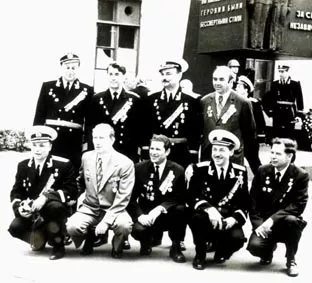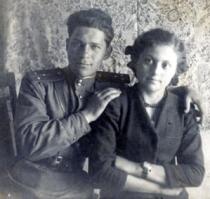Every year on the 9th of May the Naval School commanders arrange parade, where we are invited as veterans. This photo was taken during one of those holidays. I do not remember who did it.
Standing from left to right: captain Cyril Shalb (died already); commander Eugeny Baboshin, my best friend (died also - every year during 30 years he visited me on my birthday; he lost his leg on the front); captain Minchenko (he lives in Moscow, he called me recently); the former lieutenant Semen Baevsky (he got demobilized after serious wound in Stalingrad in 1942.
About 10 years ago Semen Baevsky left for Boston (America), where he lives at present). Sitting from left to right: captain Boris Birshirs (died already); Aron Tseytlin (died very long ago); Boris Lesman; Leonid Karlov (died on August, 12 here in Leningrad); Alexander Kuranov.
On June 14, 1941 I finished my school, on June 22 we were going to hold a meeting in celebration of it, but that day the war burst out. They cancelled our banquet, gave us urgently our certificates, and that was all. Approximately for a week I stayed in Kerch, and Komsomol leaders appointed me to be a company commander.
We participated in patroling the city streets (2 or 3 men together). And a week later I left for Leningrad. Here I entered the Naval School named after Frunze. I sent there my document beforehand, in 1940. That School celebrated its 300th anniversary in 2001 (it is older, than St. Petersburg itself, because it was created in 1701, and St. Petersburg - in 1703). According to the decree of the President Eltsin it was renamed Naval College of Peter the Great.
I entered the Naval School on July 3, as soon as I arrived from Kerch, and in August I was already at the front, here in Leningrad. I was a machine gunner (they changed our cloths for infantry uniform). At the end of September they brought us back to Leningrad and changed our uniform for naval one. We starved in blockade for three months, till December 9.
Later we moved to Astrakhan: our School had been already evacuated there. [Astrakhan is a city in the Delta of the Volga River.]
By that time German troops approached Volga (Stalingrad). Our School students immediately finished their practical studies and moved to Baku. But we, specialists in topography ('educated' already after a year of studies) were made lieutenants: those who had not very good marks for exams became junior lieutenants, and those who had good and excellent marks (like me, for example) became lieutenants.
We were sent to Stalingrad hell. It was the time of the famous Stalingrad battle. By the way, not all students, specialists in hydrography were sent to the front line (only 28 from 100). And the rest 72 did not participate.
We were 5 on the course, who returned from the front according to the Stalin's order; in total 22 cadets from 300 were back at School. I returned to School, which was in evacuation in Baku, at the end of April 1944.
















